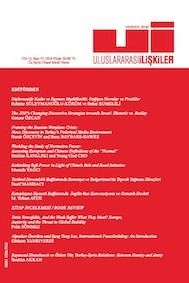
Uluslararası İlişkiler Dergisi
Yazarlar: Mustafa KİBAROĞLU
Konular:Sosyal
Anahtar Kelimeler:Korea,Nuclear,Missile,Plutonium,IAEA
Özet: Because of the inferiority complex first against Japan, then against the United States, the North Korean leadership embarked upon nuclear weapons development program from the inception of their state. Due to the tangible and comprehensive support provided by the Soviet Union and the People's Republic of China in the field of nuclear science and technology, North Korea has seemingly passed a significant threshold on the way to become a de facto nuclear weapons state. As of 2004, it is widely believed that North Korea has already extracted enough plutonium for a couple of nuclear warheads. Combined with its 1,350 kilometer-range ballistic missile capability, North Korea stands as one of the most significant threats to regional and global security and stability. In the aftermath of the September 11 terror attacks on the United States, Russia and China have greatly reduced their support to North Korea and intensified their efforts to mend the differences between that country and the US, just like Japan and South Korea did for long, with a view to not to pave the way to the escalation of a crisis on the Korean Peninsula.